初一英语春季班第八讲
冀教版七年级英语上册Lesson8 课件
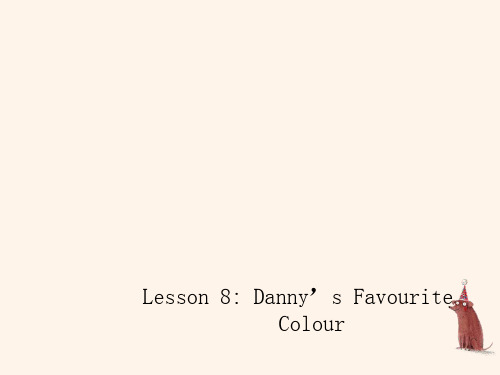
一、单项选择
1.—___A_____people travel every year?
—Perhaps when we are talking about it, more than
100 planes have taken off around the world.
8.How many c_l_a__s_s_e_s_(class) do you have at school? 9.I buy crayontso________(paint). 10.How about _mp_ia_xi_in_nt_g__(mix) these colours?
本节课主要学习了以下重点内容: (1)重点单词:want, paint, make, look等。 (2)重点短语:mix…and…, in the sky等。 (3)重点句式:I don’t like red. How about…?
3.MiHxowbltuoemaankde ygerleleonw?.
I am a rainbow. Look at me.
How many colors do you see?
I am red, orange and blue.
I am green, yellow and purple, too.
want之后加动词不 the park
定式to do表示想 tomorrow.我想明
做某事。
天去公园。
want sb. to do I want Jenny to
sth.想让某人做某 go with me.我想
事。
让詹妮和我一起
人教版七年级英语上册Unit8教学课件SectionA3a 3c共50张
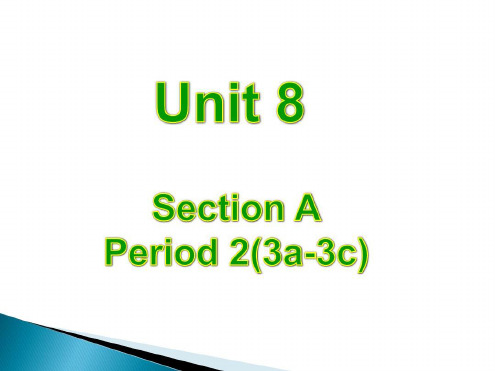
twenty-eighth twenty-ninth thirtieth thirty-first
2. 如果所指事物不是两人共有,而是各自 所有,则应在每一个名词后加“' s ”。如:
Lucy's and Mary's mothers are doctors. 露茜的妈妈和玛丽的妈妈都是医生。
Practice
汉译英。 1. 吉姆(Jim)的钢笔 ___J_im__'s__p_e_n________________ 2. 他祖父母的房子 __h_i_s_g_r_a_n_d_p_a_r_e_n_t_s_' _h_o_u_s_e____ 3. 一张中国地图 ___a_m__a_p_o_f__C_h_i_n_a___________
7. 这个房子是Daneil 和 Rickey的。 This house is Daneil and Rickey's.
8. 这个衬衫是吴江和他的弟弟的。 This shirt is Wu Jiang and his brother's.
9. 这个电脑是韦晓倩和她的妹妹的。 This computer is Wei Xiaoqian and her sister's.
first second third fourth fifth sixth seventh eighth ninth tenth eleventh twelfth thirteenth fourteenth fifteenth sixteenth seventeenth eighteenth nineteenth
初一上第8讲 Unit 8拔尖版(学生版)
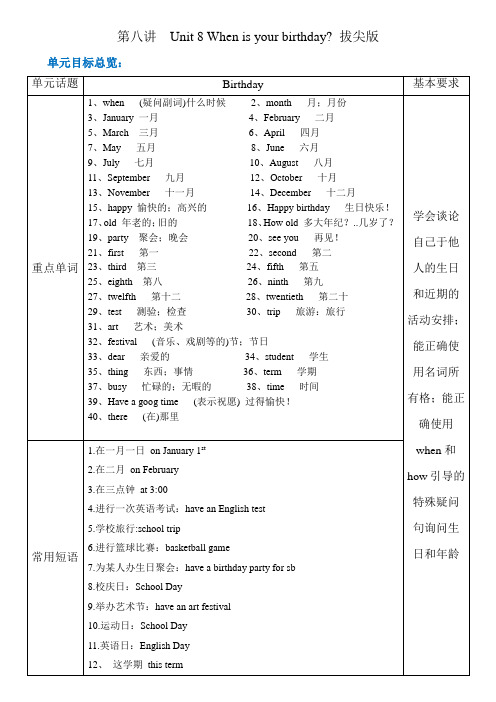
第八讲Unit 8 When is your birthday? 拔尖版单元目标总览:1、month可数名词,意为“月;月份”,其复数形式为months。
There are twelve months in a year. 一年有12个月。
短语:this month 这个月:last month上个月:next month 下个月2、When is your birthday, Mike?迈克,你的生日是什么时候?when疑问副词,意为“什么时候”,用来构成特殊疑问句,既可以用来询问比较笼统的时间,也可以用来询问具体的时间. 回答时常用in, at,on等介词构成的时间短语。
◆-When will you go to visit your parents?你什么时候去看望你的父母?-I will go to visit my parents on Monday.我星期一将去看望我的父母。
◆-When can you get here?你什么时候能到这里?-I can get here at five o’clock.我五点钟能到这里。
拓展:what time意为“什么时间”,用于询问具体的时间,如几点几分,通常直接回答某个时间点。
◆-What time do you get up?你几点钟起床?-At 6:30 .六点半3、My birthday is on June 3rd.我的生日是6月3 日。
表示英语日期时,月份的首字母必须要大写,句中的3rd是序数third的简写,用来表示顺序。
表示年、月、日时,年用基数词表示,日通常用序数词表示。
◆October 1st is our National Day. 10月1日是我们的国庆节。
4、So,how old are you, Alan.那么,你多大了,艾伦。
“How old+be+主语?用于对年龄的提问,How是疑问副词。
其答语常用“主语+be+数字”,也可直接回答数字。
初一英语上册第八讲 教材
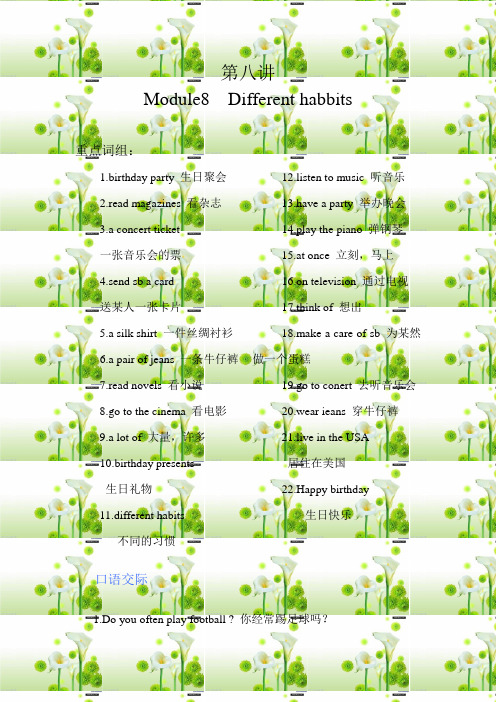
八讲Module8 Different habbits 重点词组:1.birthday party 生日聚会2.read magazines 看杂志3.a concert ticket一张音乐会的票4.send sb a card送某人一张卡片5.a silk shirt 一件丝绸衬衫6.a pair of jeans 一条牛仔裤7.read novels 看小说8.go to the cinema 看电影9.a lot of 大量,许多10.birthday presents生日礼物11.different habits不同的习惯12.listen to music 听音乐13.have a party 举办晚会14.play the piano 弹钢琴15.at once 立刻,马上16.on television 通过电视17.think of 想出18.make a care of sb 为某然做一个蛋糕19.go to conert 去听音乐会20.wear ieans 穿牛仔裤21.live in the USA居住在美国22.Happy birthday生日快乐口语交际1.Do you often play football ? 你经常踢足球吗?Yes,I do .是的。
2.Let’s give him a computer game .让我们给他个电脑游戏吧!3.Tony’s sister like s music. Shall we give her a CD as a birthdaypresent ?托尼的姐姐喜欢音乐,我们送她张CD作为生日礼物好吗?Good idea ! 好主意!4.I will have a birthday party this Saturday evening .Would you liketo come ?本周六晚上我将举行一场生日晚会,你能来吗?Yes,I’d like to .是的,我很乐意去。
最新部编RJ人教版 初中初一七年级英语 下册第二学期春季(导学案)第八单元 Unit 8 (全单元导学案)
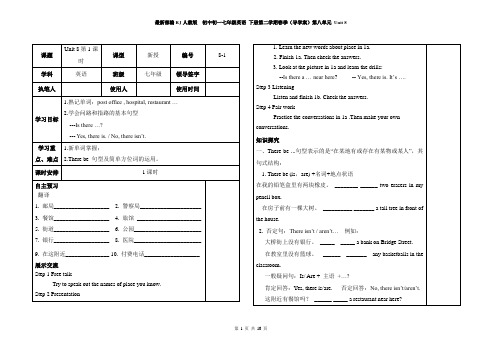
6.My mother works in a __________(医院).
7.Mike lives __________(在……附近) our school.
8.There is a new__________(旅馆)on Bridge Street.
Step 2 Presentation
1. Learn and remember the signs of transportation in 1a. Finish 1a.
Step 3 Listening
1. Look at the map in 1b.
2. Listen to the tape. Finish 1b&1c. Then check the answers.
Step 2 Presentation
1. Look at the picture in 2a.
2. Go through the sentences in 2a. Finish2a. Check the answers.
Step 3 Listening
1. Go through the sentences in 2b.
4.The restaurant is___________ (在…后面)the school.
5.The car is __________(在…前面) the building.
二、单项选择
1. The park isthe right of the bank.
A. in B. on C. at D. near
在我的铅笔盒里有两块橡皮。________ ______ two erasers in my pencil box.
七年级上册第8课知识点
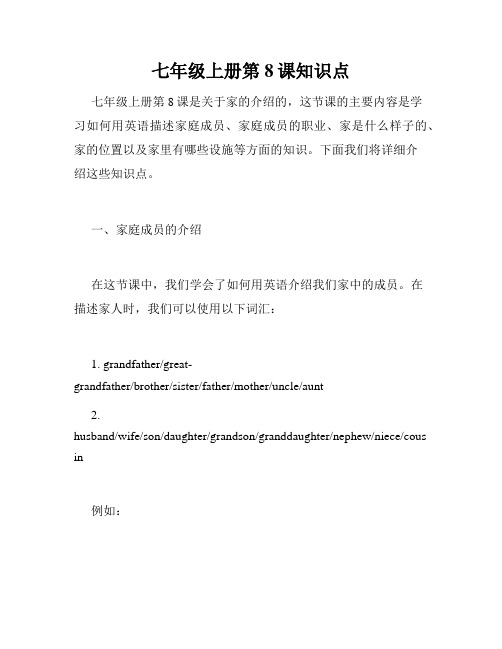
七年级上册第8课知识点七年级上册第8课是关于家的介绍的,这节课的主要内容是学习如何用英语描述家庭成员、家庭成员的职业、家是什么样子的、家的位置以及家里有哪些设施等方面的知识。
下面我们将详细介绍这些知识点。
一、家庭成员的介绍在这节课中,我们学会了如何用英语介绍我们家中的成员。
在描述家人时,我们可以使用以下词汇:1. grandfather/great-grandfather/brother/sister/father/mother/uncle/aunt2.husband/wife/son/daughter/grandson/granddaughter/nephew/niece/cousin例如:My grandfather is a lawyer in New York.(我的祖父是纽约的一名律师。
)My cousin plays basketball very well.(我的表弟打篮球打得非常好。
)二、家庭成员的职业另外,在家庭成员介绍中,我们还可以谈论家庭成员的职业,可以用以下句子:1. My father is a doctor.(我的父亲是一名医生。
)2. My aunt is a teacher at the local high school.(我的姑姑是当地高中的一名教师。
)三、家庭的位置除了描述家庭成员和职业,我们还可以用英语描述家庭的位置。
这里有一些常用的单词和短语:1. in front of(在……前面)2. behind(在……后面)3. next to(在……旁边)4. near(靠近)例如:My house is next to the park.(我的房子在公园旁边。
)The school is behind the library.(学校在图书馆后面。
)四、家庭的设施此外,我们还可以用英语描述家中的一些设施,包括:1. bedroom(卧室)2. dining room(餐厅)3. living room(客厅)4. bathroom(浴室)例如:My bedroom is on the second floor.(我的卧室在二楼。
七年级英语Module8知识点讲解课件

1.You should always knock at the door before you e enter a room.
2.I was late and I didn't want to trouble other students, so I
e enter the classroom quietly from the back door. 3.Jack enter (进入)the classroom quietly just now(刚才).
1.—Look!What's on the ground? —Oh, it's my sweater. Please help me A . A.pick it up B.put it on C.give it out D.take it zoff 2.Please don't p pick any flowers when you are in the garden. 3.露西把书捡了起来并把它放在了桌子上。 Lucy picked up the book and put it on the desk. 4.昨天我在花园里摘了一些花。 I picked some flowers in the garden yesterday.
宾语是代词
该代词只能位于pick和up之间
例如:Please help me pick up the books. =Please help me pick the books up.请帮我把这些书捡起来。 I picked them up and put them on the table. 我把它们捡了起来,并把它们放在了桌子上。
A.visit B.visiting C.visited D.to visit
初一春季班第八讲
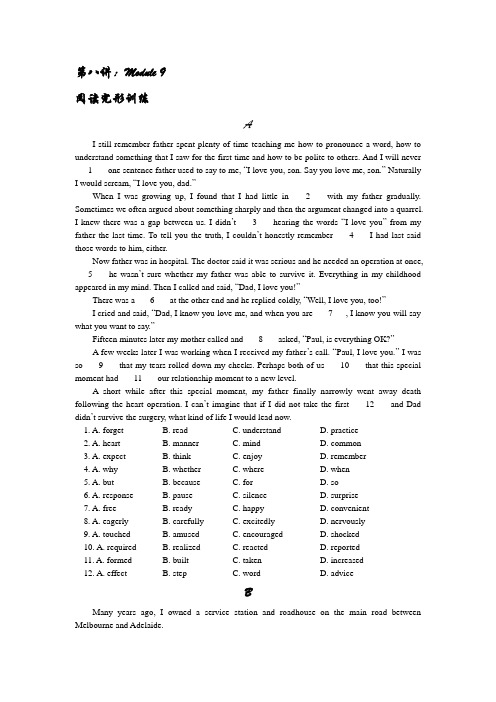
第八讲:Module 9阅读完形训练AI still remember father spent plenty of time teaching me how to pronounce a word, how to understand something that I saw for the first time and how to be polite to others. And I will never ___1___ one sentence father used to say to me, “I love you, son. Say you love me, son.” Naturally I would scream, “I love you, dad.”When I was growing up, I found that I had little in ___2___ with my father gradually. Sometimes we often argued about something sharply and then the argument changed into a quarrel.I knew there was a gap between us. I didn’t ___3___ hearing the words “I love you” from my father the last time. To tell you the truth, I couldn’t honestly remember ___4___ I had last said those words to him, either.Now father was in hospital. The doctor said it was serious and he needed an operation at once, ___5___ he wasn’t sure whether my father was able to survive it. Everything in my childhood appeared in my mind. Then I called and said, “Dad, I love you!”There was a ___6___ at the other end and he replied coldly, “Well, I love you, too!”I cried and said, “Dad, I know you love me, and when you are ___7___, I know you will say what you want to say.”Fifteen minutes later my mother called and ___8___ asked, “Paul, is everything OK?”A few weeks later I was working when I received my father’s call. “Paul, I love you.” I was so ___9___ that my tears rolled down my cheeks. Perhaps both of us ___10___ that this special moment had ___11___ our relationship moment to a new level.A short while after this special moment, my father finally narrowly went away death following the heart operation. I can’t imagine that if I did not take the first ___12___ and Dad didn’t survive the surgery, what kind of life I would lead now.1. A. forget B. read C. understand D. practice2. A. heart B. manner C. mind D. common3. A. expect B. think C. enjoy D. remember4. A. why B. whether C. where D. when5. A. but B. because C. for D. so6. A. response B. pause C. silence D. surprise7. A. free B. ready C. happy D. convenient8. A. eagerly B. carefully C. excitedly D. nervously9. A. touched B. amused C. encouraged D. shocked10. A. required B. realized C. reacted D. reported11. A. formed B. built C. taken D. increased12. A. effect B. step C. word D. adviceBMany years ago, I owned a service station and roadhouse on the main road between Melbourne and Adelaide.One very cold, wet night at about 3:30 am., there was a ___1___ on the front door of our house. A young man, wet from head to toe, ___2___ that he had run out of petrol about 30 km up the road. He had to leave his wife and his two children behind at the car and said that he would hitchhike (搭便车) back.After I had filled the car with petrol, I took him back to his car where his two-year-old and four-year-old children were both ___3___, saying they were cold. When the can had started, I suggested that they ___4___ me back.Before leaving, I had turned the heater ___5___ in the roadhouse, so they when we went in, it was nice and ___6___. While the little ones played and ran around, I prepared bread and butter for the parents, and hot chocolate for the children.It was about 5 am. Before they ___7___, the young man asked me how much he should pay me and I told him that it was $15 for the petrol. He offered to pay “call-out fee”, but I wouldn’t ___8___ it.About a month later, I received a ___9___ from Interstate, a large bus company that we had been trying to get to stop off at our roadhouse for a long time. It turned out that the young man I had helped was its general manager, the most ___10___ person in the company.In his letter, he ___11___ me again and said that, from then on, all their buses would stop at my service station. You see, a little bit of ___12___ was returned with a large number of benefits.1. A. noise B. fight C. knock D. cheer2. A. explained B. answered C. thought D. decided3. A. joking B. crying C. sleeping D. fighting4. A. allow B. help C. follow D. lead5. A. on B. off C. in D. over6. A. dry B. cool C. clean D. warm7. A. left B. arrived C. ate D. returned8. A. borrow B. accept C. pay D. lend9. A. call B. bill C. notice D. letter10. A. serious B. helpful C. important D. friendly11. A. suggested B. thanked C. troubled D. served12. A. happiness B. tiredness C. weakness D. kindnessCA little boy invited his mother to his school’s first teacher-parent meeting. To the little boy’s disappointment, she said she would go. This ___1___ be the first time that his classmates and teacher ___2___ his mother and he felt ashamed of what she looked. ___3___ she was a beautiful woman, there was a deep scar that covered the whole right side of her face. The boy never wanted to ___4___ why or how she got the scar.At the meeting, the people were impressed by the kindness and natural beauty of his mother in spite of the scar, but the little boy still felt uncomfortable and hid himself from everyone. However, he could here the conversation ___5___ his mother and his teacher. The teacher asked ___6___, “How did you get the scar on your face?” The mother replied, “___7___ my son was a baby, he was in a room that caught fire. Everyone was ___8___ afraid to go in because the fire was terrible, so I went in. As I was running toward his bed, I saw a long ___9___ of wood coming down and I placed myself over him trying to keep him from hurt. I was knocked, but luckily, afireman came in and saved ___10___ of us,” she said slowly. “This scar will be lasting, but to this day, I have never regretted what I did.”At this point, the little boy came out running toward his mother with tears in his eyes. This was his first time to hear the story. He ___11___ her in his arms and felt the great ___12___ from his mother. He held her hand tightly for the rest of the day.1. A. would B. could C. can D. must2. A. met B. greeted C. watched D. noticed3. A. Because B. Though C. So D. But4. A. know about B. think about C. look about D. tell about5. A. among B. between C. of D. in6. A. carefully B. suddenly C. nervously D. angrily7. A. As B. When C. Since D. While8. A. so B. much C. quite D. too9. A. bit B. piece C. pair D. couple10. A. both B. any C. all D. neither11. A. pushed B. held C. put D. pressed12. A. thank B. love C. sadness D. prideDJobless people just held an Unemployment Olympics(失业运动会) in New York. About 60 people took part in the first-ever games in a park.Most of the Olympians have college and graduate degrees and they didn’t expect to be out of work. They are aged from 23 to 61. They have been unemployed for an average of four months and most of them showed up alone, “Who am I going to bring?” asked Erika Gracia, an out-of-work lawyer. “My friends still have jobs.” Though the event is not encouraging, things at the Unemployment Olympics are generally cheerful. The prizes are mostly the gift certificates(礼券) to local restaurants and bars. Goddard tried to get free medical insurance as prizes but was unable to do so.The Unemployment Olympians laughed, but they were not really happy. They had moved into small apartments with friends and ask their parents for help. Three people said that they had cut back on the amount they spent on goods and had already lost weight. Some were thinking about leaving the city altogether. They are tired and bored, but on this last afternoon in March they were making light of their situation.26-year-old Nick Goddard is the organizer of the Unemployment Olympics. He said, “The Unemployment Olympics is trying to put a smile on everyone’s face, and I think it worked out very well today.” Shira Miller, who recently lost her job, said, “It seems like a fun event. I know that most people who have jobs don’t realize, but the biggest problem is, you don’t have anything to do. So it is really a nice try from the usual.”The unemployment rate in America is now about 8 percent, the highest since late 1983.1. Those who took part in the Unemployment Olympics are mainly _______.A. white-collar workersB. people in their twentiesC. people without good educationD. people who lost their jobs2. What can we know from the passage?A. The Unemployment Olympics has never been held before.B. The Unemployment Olympics is open to all Americans.C. Most of the prizes of these games are free medical insurance.D. Most of the Olympians went to the grams with their friends3. What does the underline part “cut back on” in paragraph 3 mean?A. StudiedB. ReducedC. StoredD. Improved4. From what Nick said in paragraph 4, we can infer that this activity aims to______.A. help people find a jobB. lower the unemployment rateC. cheer up jobless peopleD. help people make some friends教材知识点巩固---Module 9单项选择1.In my hometown, the weather becomes cool ________ September.A.inB. onC. atD. for2.---________?It’s July 2nd.A.What day is it todayB. What’s the date todayC. What time is itD. What’s the weather like today3.I’m sure I can ________ the truth one day.A.look outB. take outC. find outD. go out4.---I’ve just got a new MP4.---Where ________ you ________ it?---In a shopping mall near here.A.Have; boughtB. did; buyC. are; boughtD. were; getting5.He ________ an English club last year and has improved his English a lot.A.protectedB. producedC. joinedD. received6.Mary ________ to school 10 minutes ago.A.WentB. has goneC. goesD. is going7.---Did your parents sleep late on weekends?---________.A.Yes, they didB. No, they don’tC. Yes, they wereD. No, they weren’t8.More and more young people in China celebrate Christmas Day ________ December 25th.A. atB. onC. inD. to9.His father was born ________ July 13, 1950.A.onB. inC. atD. to10.Please ________ the blackboard and listen to me carefully.A.Look forB. look overC. look likeD. look at11.---Did you see a film?---________. We watched TV.A.No, we didB. No, we didn’tC. Yes, we didD. Yes, we didn’t12.He often ________ computer games last year.A.PlaysB. playedC. doesD. did13.---What did they do in summer?---________.A.In AugustB. Yes, they didC. They visited their grandparentsD. They were born in 1935.14.Tom and Mike enjoy ________ TV.A.watchingB. watchesC. watchD. to watch15.Both Alan and Jason are experienced. You can ask ________ of them for help.A.eitherB. neitherC. noneD. all16.She is good at ________ Chinese ________ math. Her favourite subject is English.A.either; orB. not only; but alsoC. neither; norD. both; and17.---Jack, is maths difficult to learn in high school?---Sure. No subject can be learned well ________ hard work.A.withoutB. throughC. byD. with18.Mr. Black is going to marry a girl he ________ in Japan last year.A.meetsB. metC. has metD. would meet19.I want to buy some postcards in the shop, ________ I don’t have enough money.A.andB. butC. orD. so20.The students from Xinjiang enjoy staying in our school because everyone is ________ tothem.A.friendlyB. gentlyC. happilyD. politely21.---Have you ever seen the movie called Los Angeles 2011?---Yes. But I think it’s ________. I fell asleep in the cinema.A. excitingB. boringC. boredD. excited22. ---Is there a post office ________ the neighbourhood?---Yes, it’s on Center Street ________ the right.A. on; inB. in; onC. in; downD. on; down23. It took me two weeks ________ reading the novels written by Guo Jingming.A. finishB. to finishC. finishesD. finishing24. The bus is coming. Be careful when you ________ the bus.A. get onB. get offC. get upD. get toA. cost; aboutB. took; forC. spent; inD. paid; for26. ---This dress looks beautiful on you. How much is it?---It ________ me more than a thousand yuan.A. spentB. costC. tookD. paid27. ---________ I do the laundry first?---No, you ________. You can do your homework first.A. Must; mustn’tB. Can; mustn’tC. Must; needn’tD. May; needn’t28. Not only my father but also my grandpa ________ flying to Singapore this weekend.A. isB. areC. wasD. were29. At the moment, everyone here ________ dumplings.A. are eatingB. eatC. is eatingD. eats30. If you do things ________, usually you can’t do them well.A. in a hurryB. from now onC. just nowD. at once翻译句子1. 当你是小孩时,你骑自行车去上学吗?_________________________________________________ 2. 他在16岁时离开学校并且开始工作。
- 1、下载文档前请自行甄别文档内容的完整性,平台不提供额外的编辑、内容补充、找答案等附加服务。
- 2、"仅部分预览"的文档,不可在线预览部分如存在完整性等问题,可反馈申请退款(可完整预览的文档不适用该条件!)。
- 3、如文档侵犯您的权益,请联系客服反馈,我们会尽快为您处理(人工客服工作时间:9:00-18:30)。
第八讲:Module 9阅读完形训练AFor 99% of human history, people took their food from the world around them. They ate all that they could find, and then moved on. Then around 10,000 years ago, about 1% of human history, people learned to farm the land.The kind of food we eat depends on which part of the world we live in, or which part of our country we live in. For example, in the south of China they eat rice, but in the north they eat noodles. In European countries near the sea, people eat a lot of fish. In central Europe, away from the sea, people don’t eat so much fish, but they eat more meat. For example, in Germany and Poland, there are hundreds of different kinds of sausages.In North America, Australia, and Europe, people eat with knives and forks. In China, people eat with chopsticks. In parts of India and the Middle East, people use their fingers to pick up food.Nowadays it is possible to transport food easily from one part of the world to another. We can eat whatever we like, at any time of the year. In Britain, bananas come from Africa; rice comes from India or the USA; strawberries come from Chile or Spain. Food is a very big business. But people in poor countries are still hungry while people in rich countries eat too much.1.10,000 years ago, people ________.A. learned to farm the landB. cooked different kinds of foodC. couldn’t find food around themD. transported food from one country to another2. In central Europe, away from the sea, people eat ________.A. more noodlesB. much fishC. more meatD. much rice3. In North America, Australia, and Europe, people ________.A. eat with chopsticksB. eat with knives and forksC. use their fingers to pick up foodD. use bread to pick up food4. __________ have many kinds of sausages.A. Chile and SpainB. America and AustraliaC. China and JapanD. Germany and Poland5. Which of the following is NOT true?A. What we eat depends on where we live.B. Poor countries still have food problems.C. Rich countries don’t need food from others.D. Nowadays we can eat whatever we like at any time of the year.BOn a cold afternoon in winter, Robert was walking on the ___1___. He looked down at the river. There was hardly any ___2___ on the river. Near the bridge, however, there was a small canoe (独木舟), with a boy in it. He was not ___3___ many clothes. Robert was going to walk ___4___ he heard a cry, “Help!” He looked down and saw the boy was in water and his canoe was far away.Robert was a good ___5___. Taking off his clothes, he jumped into the river. The cold water made him tremble (颤抖) all over. Soon he ___6___ the boy and started to swim towards the riverbank. Just then he saw a motor boat under the bridge. There were some people on it, all ___7___ in his direction (方向). Robert ___8__ to swim towards the boat.“Help me,” Robert shouted __9___ he got near the boat. He looked up into the row of faces. “Why?” he thought. “They look so ___10___.” Silently they helped the boy into the boat. But they did not move to save Robert.“Aren’t you going to pull me ___11___, too?” Robert asked.“You!” said one of the men, who was standing next to a large camera, “Why, we were makinga film and you spoiled (搅乱) the who afternoon’s work! You can ___12___ in the water.”1. A. street B. ground C. bridge D. road2. A. boat B. fish C. sounds D. water3. A. putting B. wearing C. dressing D. taking4. A. when B. while C. after D. since5. A. swimmer B. soldier C. worker D. Sportsman6. A. arrived B. reached C. swam D. caught7. A. seeing B. shouting C. smiling D. looking8. A. decided B. hoped C. agreed D. thought9. A. till B. for C. as D. though10.A. afraid B. excited C. pleased D. angry11.A. on B. out C. away D. off12.A. swim B. play C. leave D. stayCBenjamin Franklin invented America’s first lending library in 1731 in Philadelphia, Pennsylvania. But the public library system (系统) was greatly improved in the late 1800’s. Andrew Carnegie gave millions of dollars to help build free public libraries across the country.Andrew Carnegie believed that libraries could help American’s young and old. He knew that the more libraries there were, the more people would have chance to read books, articles, news and more. “There are now more public libraries in the United States than McDonalds restaurants,”said Clara Hayden, a worker in a library.Now, there is a public library in or near a neighbourhood. After all, the United States is home to 9225 public libraries. Today, libraries continue to change and grow. Seven out of ten libraries offer free Internet service. This opens many doors for people who cannot go online at home, helping people ask for jobs online.Libraries are also teaching kids about the fun of reading. One new program called Read! Build! Play! combines reading with playtime. As kids listen to a book being read aloud, they play a game to know about the story.Benjamin Franklin once said, “The doors of wisdom are never shut.” As long as the doors of public libraries are open, his saying is most certainly true!1.Who invented America’s first lending library?A. Franklin.B. Carnegie.C. McDonald.D. Clara Hayden.2. Why did Carnegie build so many libraries?A. Because libraries could help American people.B. Because libraries could help people in the world.C. Because all the books were very interesting.D. Because he wanted to sell books to the libraries.3. Which of the following is true?A. People can surf the Internet in any library in the USA.B. It’s very cheap to surf the Internet in libraries in the USA.C. People can surf the Internet in most of the libraries in the USA.D. People paid no money for surfing the Internet in some libraries of the USA.4. What is Read! Build! Play!?A. A sport game.B. A teaching game.C. A speaking game.D. A reading game.5. What is the passage mainly about?A. Benjamin Franklin.B. The history of American libraries.C. Andrew Carnegie.D. An interesting game.DAustralia is the largest island in the world. It is ___1___ smaller than China. It is in the south of the earth. Australia is big, but its population is ___2___. The population of Australia is nearly as large as that of Shanghai.The cities in Australia have got little air or water pollution. The sky is blue and the water is ___3___. You can see fish swimming in the rivers clearly. Plants grow very well.Last month we visited Perth, the biggest city ___4___ Western Australia, and went to a wild flowers’exhibition (展览). There we saw ___5___ large number of wild flowers. We had a wonderful time. Perth is ___6___ for its beautiful wild flowers. In spring every year Perth has the wild flowers’exhibition. ___7___ visiting Perth, we ___8___ a day in the countryside. We sat down and had a rest near a path at the foot of a hill. It was quiet and we enjoyed ourselves. Suddenly we heard bells ringing at the top of the hill. What we say made us ___9___ all our things and run back to the car as quickly as we could. There were about three hundred sheep ___10____ towards us down the path. And I saw a very, very fat sheep!Australia is well-known for its sheep and kangaroos. After a short drive from ___11___ town, you will find yourself in the ___12___ of white sheep. Sheep, sheep, everywhere are sheep.1. A. little B. a little C. a few D. few2. A. small B. big C. large D. amazing3. A. dry B. dirty C. cool D. clean4. A. in B. on C. to D. for5. A. an B. a C. the D. /6. A. good B. famous C. great D. rich7. A. Front B. Behind C. Before D. After8. A. took B. paid C. spent D. cost9. A. pick up B. look up C. put up D. get up10. A. going B. arriving C. reaching D. coming11. A. some B. all C. any D. many12. A. left B. middle C. right D. fieldEPeople all over the world celebrate the New Year. However, not all countries celebrate in the same way, and in some countries, the new year doesn’t begin on the same date every year.___1___ But people start celebrating on 31st De cember, New Year’s Eve. In New York, many people go to celebrate in Times Square. While they’re waiting for the New Year, they listen to music, sing traditional songs and have fun. Just before 12 o’clock, everyone counts down from 10: 10, 9, 8…2. ___2___.New Year’s Day is often a family day. Some families get together for a special meal. When the weather is fine, many families go out for a walk.___3___ They write down a list of things, such as “I will help out more with housework. I will work harder at sc hool than others.” or “___4____” When they have made their list, they read it toFThe Canadian people are not all the same. There are many different groups. They came to Canada at different times. They came from different places. Many of them still live in different ways.Long ago, only Native Americans lived in Canada. They arrived thousands of years ago. Today there are about fifty different American groups.The Eskimos came after the Native Americans did. They have also been in Canada for a long, long time. Most Eskimos live in the north of Canada, where it is very cold.The European settlers started arriving 450 years ago. Most came from France. They are a large group in Canada today. They follow French customs or ways of doing things. They speak French.Later, most settlers came from England and Scotland. They speak English. Today more than half of all Canadians speak English. Canadians have also come from Germany and Italy. There are smaller groups from other places, too.You can see that different kinds of people are called Canadians. Many do not want to forget their own customs and languages. But they share a large country. They share a future in that country. They are all Canadians.1.Who first came to live in Canada?___________________________________________2.Where do most Eskimos live?___________________________________________3.How long have the European settlers been in Canada?___________________________________________4.What language do most Canadians speak today?___________________________________________5.The Canadians look the same, don’t they?___________________________________________GOne summer evening as I was cooking dinner, there was a knock at the door. I opened it andsaw an old man. But his voice was pleasant as he said, “Good evening. I come to see if you have a room for just one nig ht. I live far away from here, and there’s no bus till next morning.”I told him we would find him a bed, but it was not comfortable. I went inside and cooked dinner. When we were ready, I asked him if he would like to join us. “No, thank you. I have plent y.” When I had finished the dinner, I went out to talk with him. He told me he fished for a living to help his daughter, her five children, and her husband, who was disabled from a back injury.At bedtime, we put a bed in the children’s room for him. On hi s next trip, as a gift, he brought a big fish and some fresh oysters (牡蛎). In the years he came to stay overnight with us, and there was never a time he did not bring us some fish or vegetables from his garden.I know it was thankful for our family to know him, from whom we learn what was to accept the bad without a complaint and the good with thanks.1.Why did the old man go to the writer’s house?A.To give a fish to the writer. C. To stay for the night.B.To sell some fish. D. To ask for some money.2.How many people were there in the old man’s daughter’s family?A.Two.B. Four.C. Six.D. Seven.3.Which of the following is true?A.The old man stayed for the night with the writer only once.B.The old man came to the writer’s house to ask for some food.C.The old man felt lonely because he had no son or daughter.D.The old man came to stay with the writer for the night many times.4.From the last paragraph we know the writer ________.A.learnt something helpful from the old manB.didn’t know about the old man at allC.did something helpful for the old manD.didn’t want to see the old man any longer教材知识点巩固---Module 9单项选择1.In my hometown, the weather becomes cool ________ September.A.inB. onC. atD. for2.---________?It’s July 2nd.A.What day is it todayB. What’s the date todayC. What time is itD. What’s the weather like today3.I’m sure I can ________ the truth one day.A.look outB. take outC. find outD. go out4.---I’ve just got a new MP4.---Where ________ you ________ it?---In a shopping mall near here.A.Have; boughtB. did; buyC. are; boughtD. were; getting5.He ________ an English club last year and has improved his English a lot.A.protectedB. producedC. joinedD. received6.Mary ________ to school 10 minutes ago.A.WentB. has goneC. goesD. is going7.---Did your parents sleep late on weekends?---________.A.Yes, they didB. No, they don’tC. Yes, they wereD. No, they weren’t8.More and more young people in China celebrate Christmas Day ________ December 25th.A. atB. onC. inD. to9.His father was born ________ July 13, 1950.A.onB. inC. atD. to10.Please ________ the blackboard and listen to me carefully.A.Look forB. look overC. look likeD. look at11.---Did you see a film?---________. We watched TV.A.No, we didB. No, we didn’tC. Yes, we didD. Yes, we didn’t12.He often ________ computer games last year.A.PlaysB. playedC. doesD. did13.---What did they do in summer?---________.A.In AugustB. Yes, they didC. They visited their grandparentsD. They were born in 1935.14.Tom and Mike enjoy ________ TV.A.watchingB. watchesC. watchD. to watch15.Both Alan and Jason are experienced. You can ask ________ of them for help.A.eitherB. neitherC. noneD. all16.She is good at ________ Chinese ________ math. Her favourite subject is English.A.either; orB. not only; but alsoC. neither; norD. both; and17.---Jack, is maths difficult to learn in high school?---Sure. No subject can be learned well ________ hard work.A.withoutB. throughC. byD. with18.Mr. Black is going to marry a girl he ________ in Japan last year.A.meetsB. metC. has metD. would meet19.I want to buy some postcards in the shop, ________ I don’t have enough money.A.andB. butC. orD. so20.The students from Xinjiang enjoy staying in our school because everyone is ________ tothem.A.friendlyB. gentlyC. happilyD. politely21.---Have you ever seen the movie called Los Angeles 2011?---Yes. But I think it’s ________. I fell asleep in the cinema.A. excitingB. boringC. boredD. excited22. ---Is there a post office ________ the neighbourhood?---Yes, it’s on Center Street ________ the right.A. on; inB. in; onC. in; downD. on; down23. It took me two weeks ________ reading the novels written by Guo Jingming.A. finishB. to finishC. finishesD. finishing24. The bus is coming. Be careful when you ________ the bus.A. get onB. get offC. get upD. get to26. ---This dress looks beautiful on you. How much is it?---It ________ me more than a thousand yuan.A. spentB. costC. tookD. paid27. ---________ I do the laundry first?---No, you ________. You can do your homework first.A. Must; mustn’tB. Can; mustn’tC. Must; needn’tD. May; needn’t28. Not only my father but also my grandpa ________ flying to Singapore this weekend.A. isB. areC. wasD. were29. At the moment, everyone here ________ dumplings.A. are eatingB. eatC. is eatingD. eats30. If you do things ________, usually you can’t do them well.A. in a hurryB. from now onC. just nowD. at once翻译句子1. 当你是小孩时,你骑自行车去上学吗?_________________________________________________2. 他在16岁时离开学校并且开始工作。
